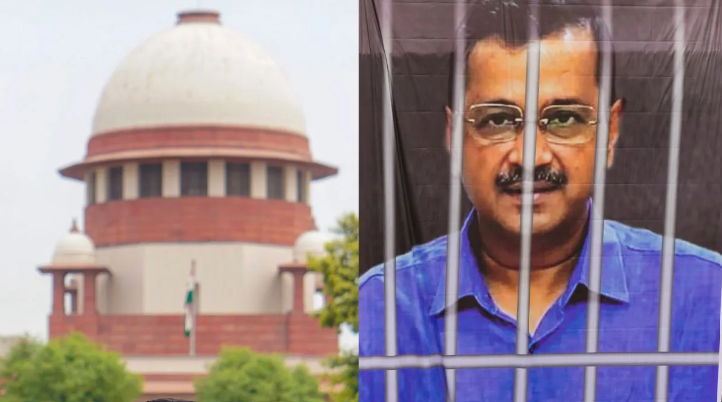Arvind Kejriwal Seeks Bail in CBI Case
New Delhi: The Supreme Court is currently reviewing Delhi Chief Minister Arvind Kejriwal’s petitions for bail and his challenge to his arrest in the CBI case related to the now-repealed liquor policy. The bench, consisting of Justice Surya Kant and Justice Ujjal Bhuyan, is hearing the matter.
Previously, the Supreme Court granted interim bail to Kejriwal in the Enforcement Directorate (ED) case, but he remains incarcerated in the CBI case. If the Supreme Court grants relief in this instance, Kejriwal could be released from prison after more than five months.
Kejriwal was arrested by the CBI on June 26. The Delhi High Court upheld his arrest on August 5, finding that the CBI had demonstrated that the AAP leader might influence witnesses.

Senior Advocate Abhishek Singhvi, representing Delhi Chief Minister Arvind Kejriwal, argued that this case is unprecedented. Singhvi noted that Kejriwal has already received relief twice under the stringent Prevention of Money Laundering Act (PMLA). He described the CBI’s action as an “insurance arrest,” implying it was designed to ensure Kejriwal remained in jail despite prior court orders.
Singhvi highlighted that the CBI arrested Kejriwal after a two-year gap and emphasized that there are three court orders in his favor. He urged the Supreme Court to address three key questions: Is there a risk of flight? Will there be tampering with evidence? Will there be witness influence? Singhvi contended that the CBI’s sole justification for the arrest was Kejriwal’s alleged lack of cooperation, a situation that, according to previous judgments, does not warrant self-incrimination.
He further argued that Kejriwal, as a constitutional functionary, poses no flight risk, and there is no possibility of evidence tampering or witness influence given the extensive documentation and multiple chargesheets filed. Singhvi asserted that the triple test for bail—risk of flight, evidence tampering, and witness influence—has been met in Kejriwal’s favor.
Singhvi also pointed out that Kejriwal had been deemed fit for release twice, including by the Supreme Court under the higher threshold of Section 45 of the PMLA. He criticized the special judge’s decision as lacking substantial grounds and argued that the arrest was made merely as a precaution.
Justice Kant noted that while both sides will be heard, there is concern about the duration of the bail hearing. Additional Solicitor General SV Raju, representing the CBI, requested as much time as Singhvi was given. Singhvi agreed, requesting to extend his argument until noon to complete by lunch.
The CBI’s counsel questioned whether Singhvi was addressing bail or arrest, but Singhvi responded by emphasizing that all co-accused had been released and reiterated that the triple test for bail was satisfied. He referenced multiple chargesheets and cited the Manish Sisodia judgment, which noted that completing the trial in the excise policy case is unlikely. Singhvi argued that prolonged incarceration is unjustified and that the conditions for bail have been met.
